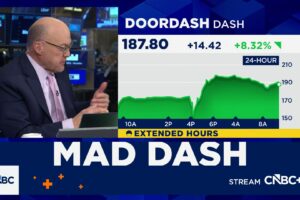Mid-cap company DigitalOcean is competing against Microsoft Azure, Amazon Web Services, and Google Cloud.
With less than two months remaining in 2024, now is a great time for investors to think about which stocks they want to carry into 2025. At the moment, artificial intelligence (AI) looks like it will continue to be a dominant theme across the market in 2025, so you might want to start by looking at companies that compete in that arena.
DigitalOcean (DOCN 2.31%) is a mid-cap company that provides cloud computing services exclusively to small and mid-sized businesses (SMBs), but it also has a growing portfolio of AI services which includes state-of-the-art data center infrastructure fitted with industry-leading chips from Nvidia.
DigitalOcean stock is currently trading near the cheapest level in its history as a public company, as measured by one common valuation metric, and it could be an ideal stock to buy now.

Image source: Getty Images.
Walking with giants
Amazon Web Services, Microsoft Azure, and Alphabet‘s Google Cloud are the top three providers of cloud services globally. So how does a company like DigitalOcean, with a market cap below $4 billion, compete with those multitrillion-dollar giants?
Simply put, it focuses on a segment of the market that the megacaps don’t cater to — businesses with under 500 employees, especially those in the start-up phase. The cloud industry leaders mostly chase after larger enterprises because those companies tend to spend the most money. It isn’t as economical for them to target start-ups or SMBs.
DigitalOcean provides cheap and transparent pricing, highly personalized service, and simplified deployment tools, which suit SMBs because they have limited resources and typically can’t afford to have in-house technical staff. In fact, 474,000 of DigitalOcean’s 638,000 customers only spend $15 per month (on average) with the company. The hope is that some of them will eventually become “scalers” — a category of customer that spends an average of $2,153 per month with DigitalOcean.
Right now, the company has around 18,000 scalers on its client list, and they account for more than half of its monthly revenue.
DigitalOcean has entered the AI race
Last year, DigitalOcean acquired Paperspace, an operator of data centers specifically designed for AI developers. It offers per-second billing and no lock-in contracts — ideal features for SMBs looking to deploy AI, especially because its prices can be up to 70% cheaper than equivalent services from Microsoft Azure.
The cloud industry leaders (including Azure) offer AI developers access to servers running thousands of graphics processing units (GPUs) from suppliers like Nvidia. However, SMBs typically don’t need nearly that much computing horsepower. Recognizing this, DigitalOcean recently announced it will allow its customers to access fractional GPU capacity. That means they can pay to use between one and eight Nvidia H100 GPUs, a level of service that will allow even the smallest businesses to deploy some AI-supported systems.
Fractional GPU capacity isn’t widely available in the industry, and it’s unlikely cloud giants like Microsoft and Amazon will try to compete at such a small scale. That gives DigitalOcean an incredible advantage in this particular market, and demand is already soaring.
During the third quarter, DigitalOcean generated a record $198.5 million in total revenue, which was a 12% increase from the year-ago period. However, its AI revenue specifically soared by nearly 200%.
DigitalOcean stock appears cheap right now
DigitalOcean only started generating consistent quarterly GAAP profits last year, so it might be too early to value its stock based on the traditional price-to-earnings (P/E) ratio. However, it has generated $0.87 in trailing 12-month earnings per share (EPS), so based on its stock price of $38.50 as of this writing, its P/E ratio is 44.2.
That appears expensive relative to the tech-heavy Nasdaq-100 index, which currently has a P/E ratio of 33.1. However, DigitalOcean grew its EPS by a whopping 1,650% year over year in the first nine months of 2024. If that trend continues, the stock will probably start looking cheap on a P/E basis sometime in 2025.
For now, the price-to-sales (P/S) ratio might be a better way to measure this company’s value. Based on DigitalOcean’s trailing 12-month revenue of $756.6 million and its current market capitalization, its stock trades at a P/S ratio of 4.8. That’s nearly its cheapest level since it went public in 2021. It’s also a 43% discount to its lifetime average P/S ratio of 8.5.
DOCN PS Ratio data by YCharts.
According to the researchers at market intelligence firm IDC, the cloud market for SMBs is currently worth $114 billion annually, so DigitalOcean has barely scratched the surface of its opportunity. Plus, IDC forecasts that this segment of the market will grow to $213 billion by 2027, but the tailwind of the AI revolution could catapult that number into the trillions. Depending on which Wall Street forecast you rely upon, AI could add between $7 trillion and $200 trillion to the global economy in the coming decade, and DigitalOcean has the potential to win a significant chunk of the SMB segment.
Therefore, investors who are seeking a new AI opportunity to add to their portfolio and carry into 2025 should definitely consider DigitalOcean.
John Mackey, former CEO of Whole Foods Market, an Amazon subsidiary, is a member of The Motley Fool’s board of directors. Suzanne Frey, an executive at Alphabet, is a member of The Motley Fool’s board of directors. Anthony Di Pizio has no position in any of the stocks mentioned. The Motley Fool has positions in and recommends Alphabet, Amazon, DigitalOcean, Microsoft, and Nvidia. The Motley Fool recommends the following options: long January 2026 $395 calls on Microsoft and short January 2026 $405 calls on Microsoft. The Motley Fool has a disclosure policy.












